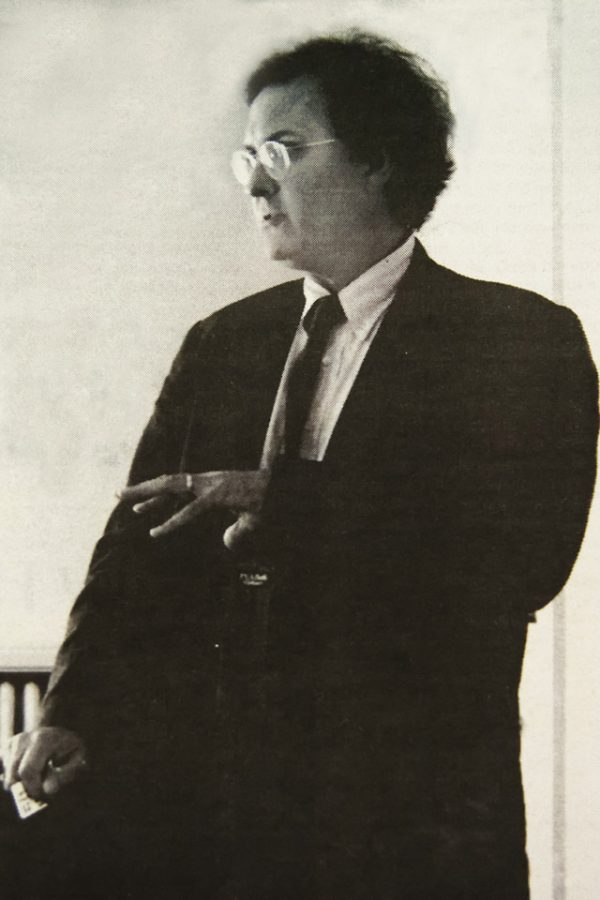Director, founder of Study Abroad Office to retire after 30 years at Northwestern
Bill Anthony, founding director of Northwestern’s Study Abroad Office, discusses his inaugural goals at a meeting in 1997. Anthony will step down from his post in July after a combined 30 years at the University as an educator and administrator.
May 27, 2016
Bill Anthony comes from a long line of storytellers. Growing up with three siblings, his parents would read him the Sunday comics, from which he acquired a self-professed “irreverent” sense of humor. His grandfather, a dentist, used tales instead of novocaine to narcotize patients. And his wife, Carolyn, is the director of the Skokie Public Library.
“Human beings are the only prescient life forms on this planet who narrate in the past tense,” Bill Anthony said. “It’s the glue that bonds us all together — we tell funny stories, sad stories, profound stories. We are born storytellers.”
And he has a world’s worth of stories to tell.
Anthony, who founded Northwestern’s Study Abroad Office in 1997, will step down as director at the end of this year. Current associate director Alicia Stanley will temporarily take over until the University finds a permanent replacement. During his tenure, the office expanded its international offerings to more than 50 countries, expanded the number of University-affiliated programs more than tenfold and increased how many undergraduates study abroad per year from about 100 to more than 750.
“He’s generous with creative ideas and praise,” Stanley wrote in an email to The Daily. “He has a unique gift of balancing seriousness of purpose about our important mission and hard work with a sense of humor, and employs his storytelling abilities at just the right moments.”
When Anthony first arrived at the University in 1986 as a German lecturer, he said the study abroad process was in disarray. Separate committees with different standards determined a prospective student’s eligibility to go abroad. One student in SESP, for example, might receive credit for a particular program, while a Weinberg student might not, he said.
In 1997, NU opened its Study Abroad Office with Anthony at the helm. The office, which originally offered 11 affiliated programs, dissolved the disjointed committee process and began to review applications independently.
“Some ideas crystallized slowly and then suddenly the fog disappeared and it became obvious that this (office) was a necessity,” Anthony said. “During that first full year under our aegis … the numbers doubled right away, and we did not know then how fast they would go up.”
But Anthony’s influence on the world of study abroad extends far beyond NU. In 2007, New York’s attorney general launched an inquiry into whether universities were accepting perks such as complimentary travel expenses for partnering with specific study abroad programs. In response to the inquiry, Anthony helped craft a transformative code of ethics that has since been adopted by more than 750 institutions, said Brian Whalen, president and CEO of The Forum on Education Abroad, a nonprofit that provides training and resources to its members. At the time, no such regulations governed study abroad.
“The code of ethics reflected very well on the seriousness and ethical way in which universities in the forum membership go about their work,” Whalen said. “It was a key moment, and Bill was one of the leaders of the whole effort.”
As a child, however, Anthony did not travel much. It wasn’t until after high school, when asked to represent his school on a trip to Germany, that he finally left the United States.
Anthony said he had little prior knowledge of Germany and initially struggled to assimilate. Back in the 1960s, he said, there were no pre-orientation meetings, study abroad liaisons or any of the other resources students enjoy today. Instead, the school placed him on a boat with three large duffel bags and bid him adieu.
After he returned to the U.S., Anthony began a pre-med track at Colby College but quickly switched to a German and English double major. Following a six-year stint teaching at a high school outside Baltimore, he joined NU.
“The first impression of Bill is his humor,” said German Prof. Franziska Lys, a long-time friend of Anthony’s. “He’s a practical joker with his colleagues.”
Lys said she worked with Anthony to produce educational documentaries of German life, which they subsequently used to teach students. She said the documentaries — ranging from history of the classic Trabant cars to Berlin apprenticeships — yielded an unprecedented glimpse into the German way of life, previously presented through stolen restaurant menus and outdated magazines.
Kathy Dedo (Communication ’90), who took introductory German with Anthony as a freshman, said she recalled his “earnest, goofy” manner of teaching and his care for students. Dedo said Anthony inspired her to continue pursuing German classes long after fulfilling her language requirement.
After decades of helping students create their own stories abroad, Anthony will give up his post in July to do some storytelling of his own. Despite having newfound spare time to pursue fiction writing and painting, Anthony said he has mixed feelings about retirement. Nevertheless, he has accepted the impending transition.
“At some point you have to go and let the next generation come on,” he said. “And the next generation is here.”
Email: davidpkfishman@u.northwestern.edu
Twitter: @davidpkfishman


